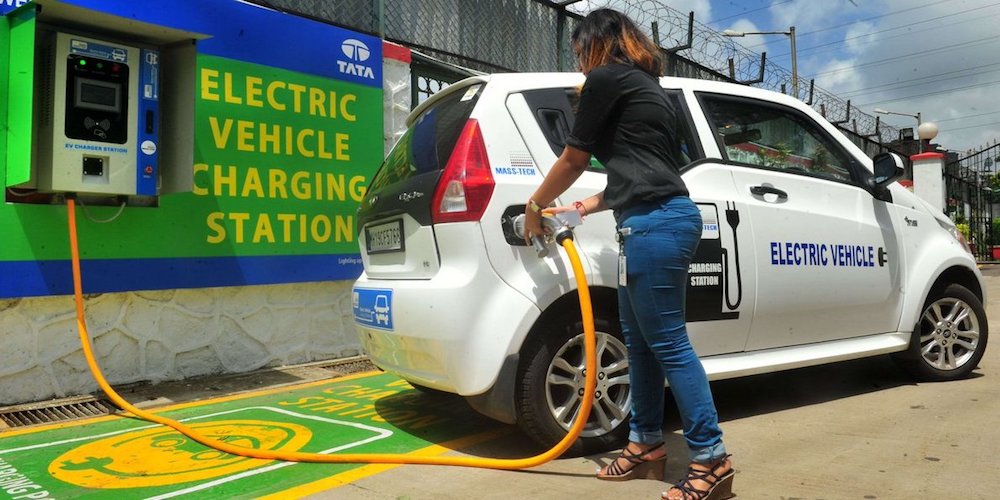Campaign to promote Electric Vehicles get a Big Boost

As per information received from the Convergence Energy Services Limited (CESL, a 100% Owned subsidiary of Energy Efficiency Services Limited or EESL) that is under the Ministry of Power, the central government is seriously implementing the e-Mobility Programme to provide an impetus for domestic electric vehicle manufacturers, charging infrastructure companies, fleet operators, service providers etc.
In the process the domestic industry is gaining efficiencies of scale so as to drive down costs, create local manufacturing facilities, grow technical competencies for the long-term growth of the electric vehicle (EV) industry in India and to enable Indian EV manufacturers to emerge as major global players.
The objective here is to reduce dependence on oil imports.
Under this programme, EESL/CESL concluded the procurement of various categories of electric cars through an international competitive bidding process.
Till date, EESL/CESL have deployed/under deployment 1,590 EVs in more than 160 Central and state government departments in 49 cities. These e-cars are being given on lease/outright purchase basis to replace the existing petrol and diesel vehicles taken on lease earlier.
EESL/CESL is also developing Electric Vehicle Charging Infrastructure and has signed MoUs with multiple stakeholders across municipalities, DISCOMs for location assessment study and setting up of charging infrastructures in their jurisdiction location. As on date EESL/CESL has installed 301 nos. of EV chargers across India.
Thirteen states of Andhra Pradesh, Delhi, Karnataka, Kerala, Madhya Pradesh, Maharashtra, Tamil Nadu, Telangana, Uttar Pradesh, Uttarakhand, Meghalaya, Gujarat and West Bengal have approved/notified dedicated electric vehicles (EV) policies to promote adoption of electric vehicles.
It may be noted that the National Electric Mobility Mission Plan (NEMMP) 2020 is a National Mission document providing the vision and the roadmap for the faster adoption of electric vehicles and their manufacturing in the country. This plan was designed to enhance national fuel security, to provide affordable and environmentally friendly transportation and to enable the Indian automotive industry to achieve global manufacturing leadership.
It may also be noted that the FAME (Faster Adoption and Manufacturing of Hybrid and Electric vehicle) scheme was announced in 2019 with an outlay of Rs.10,000 crore and the government expected to incentivize the purchase of 7,090 electric buses, 35,000 four-wheelers, 500,000 three-wheelers and 1 million two-wheelers. In reality, though, due to the high localization norms and other rules, most of the products in the segment did not qualify for the incentives. The ones that qualified did not get enough subsidies to close the price gap with combustion engine vehicles.
Based on outcome and experience gained during Phase-I of FAME India Scheme and after having consultations with all stakeholders, including Industry and Industry Associations, the Government notified Phase-II of FAME India Scheme for a period of three years commencing from 1st April,2019 with a total budgetary support of Rs. 10,000 crore.
Under Phase-II of FAME India Scheme, Rs.1000 Cr. is allocated for development of charging stations. Further, the Ministry has sanctioned 2,877 Electric Vehicles (EVs) Charging Stations amounting to Rs 500 Crore (Approx.) in 68 cities across 25 States/UTs under FAME India Scheme Phase II.
The Ministry of Heavy Industry has announced a 50% increase in incentives for electric two-wheelers to Rd. 15,000 per kilowatt hour from Rs.10,000 per kWh. According to the new rules, the cap on incentives will be limited to 40% of the total price compared to the earlier cap of 20%. The ministry of heavy industries has also mandated Energy Efficiency Services Ltd (EESL) to procure 300,000 electric three-wheelers for use by different authorities.
The public sector unit has been given the responsibility to procure electric buses for deploying across cities.
This phase mainly focuses on supporting electrification of public & shared transportation, and aims to support through demand incentive 7090 eBuses, 5 lakh e-3 Wheelers, 55000 e-4 Wheeler Passenger Cars and 10 lakh e-2 Wheelers. In addition, creation of charging infrastructure is also supported under the Scheme.
Data as of July 29, 2021 suggests that under Phase-II of FAME India Scheme, 92,393 Electric Vehicles have been supported by way of Demand Incentive amounting to about Rs. 278 Cr. Further, 6265 electrical buses have been sanctioned to various State/City Transport Undertakings under Phase-II of the Scheme. The Ministry has also sanctioned 2,877 Electric Vehicles (EVs) Charging Stations amounting to Rs 500 Crore (Approx.) in 68 cities across 25 States/UTs under FAME India (Faster Adoption and Manufacturing of Hybrid & Electric Vehicles in India) Scheme Phase II.



